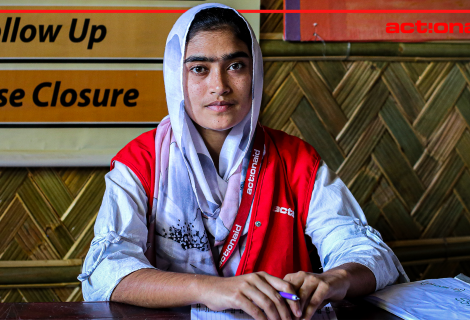'Women and girls are living in a pressure cage'

Sharmin Akter, 21, is a case management worker for ActionAid. She supports women and girls living in the Rohingya refugee camps at Cox’s Bazar, Bangladesh. Here, Sharmin explains why Covid-19 reaching the densely populated camps could be an unimaginable a disaster.
More than 800,000 people are living in a small area, homes are small, close together and overcrowded. Typically, there are five to seven people living in one 10ft x 15ft shelter made out of bamboo and tarpaulin so social distancing is incredibly difficult. The Rohingya refugees are particularly vulnerable because their nutrition and health has been very poor after fleeing persecution, and now they are living in a very congested space with limited access to clean water. The risks are tremendous.
Women and girls will be most at risk. We are already seeing gender-based violence has massively increased since the start of the pandemic. Heightened fear of catching the disease will compound the situation.
A young woman needed nine stitches recently after her neighbour’s husband slashed the soles of her feet with a knife during an argument over hygiene conditions.
She told me that because the men are at home due to the coronavirus lockdown, arguments which could have been resolved, are quickly becoming aggressive and reaching violent new levels.
Husbands are at home in a small space with their families all day. The children and wives might be asking for food and then the husband, who does not have an income, will become frustrated.
If the situation carries on like this, then I fear violence in the camp could become extremely bad in the next month or two. Husbands cannot go out of the house, so the women and girls are living in a pressure cage.
People are going hungry and struggling to access medical support. Everyone has a ration card and the food is coming into the camp, but the problem is that it cannot be distributed like it used to be. Due to social distancing, staff are working on a rota, which reduces the amount of food that can be distributed each day. The queues for food support are very long and some people are going home with nothing.
The lockdown is disrupting many vital services. The health centres have said that they will only see 10 patients a day. Before the pandemic, they would see more than 30 people. This has been a real concern, especially with the rise in violence and the increase in demand for medical services.
Many refugees fear what will happen to them if they are diagnosed with COVID-19. This is stopping people from getting medical treatment and seeking help if they have a fever.
We are doing a lot of work to dispel fake news and misinformation about the disease and to promote public health messages so that people know how to protect themselves.
At the start of the pandemic many people did not want to believe it what was happening. I’m running awareness-raising sessions for groups of women and teenage girls. We show them how to use the gloves and masks, and how to maintain social distancing.
Now people across the camp are starting to understand the dangers of the disease and the need to stay safe.
All around the world, there is a lot of uncertainty and fear over coronavirus. At the start of the pandemic, I was scared. But as a humanitarian worker, I told myself I cannot stay working at home. My mother was very worried about me, but I explained to her how much suffering the people we support have already been through and how they needed my help.
ActionAid is working hard to protect their staff and the communities we work with. While working, I wear the correct Personal Protective Equipment (PPE), gloves, masks and use hand sanitiser.
Even though the work can be tough, I feel proud that I can stand beside the women and girls in the camp during this time. I saw some children playing recently and they were making sure they maintained a safe distance from each other. Seeing things like this reassures me. But now coronavirus has reached the camps, I am very worried for everyone’s safety.
- For more information about ActionAid’s response to the COVID-19 crisis and how you can support frontline workers visit: https://www.actionaid.org.uk/donate/emergency/coronavirus-appeal
- Sharmin's story was first published in The Independent, visit: https://www.independent.co.uk/voices/coronavirus-lockdown-refugees-rohingya-coxs-bazar-bangladesh-women-girls-a9531506.html